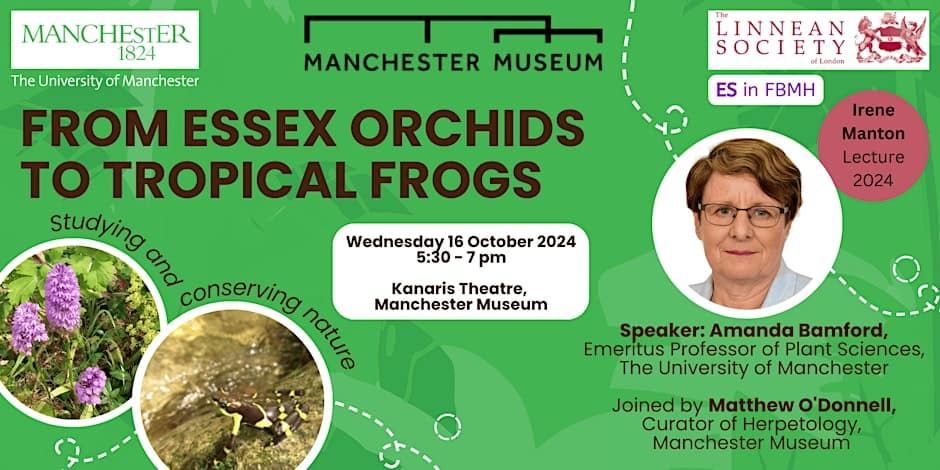Irene Manton Lecture 2024
From Essex Orchids to Tropical Frogs
The University of Manchester’s Faculty of Biology, Medicine and Health, in collaboration with The Linnean Society of London and Manchester Museum, will host the 2024 Irene Manton lecture, celebrating the significant contribution made by women to the Natural Sciences.
For this year’s extra special event, marking the 10th anniversary of the lecture, as well as the University’s bicentenary year, we are delighted to welcome Amanda Bamford, Emeritus Professor of Plant Sciences, The University of Manchester. Amanda is also the Academic Lead who initially formed the Linnean/University partnership, so it is especially significant that she delivers the 10th lecture.
Amanda will journey from her roots in industrial Essex to interdisciplinary conservation collaborations in Central America, and along the way present how we can study nature and connect with others to create a more positive future for wildlife.
Amanda will be joined by Matthew O’Donnell, Curator of Herpetology at Manchester Museum, to present the Museum’s in-situ and ex-situ conservation work with endangered Costa Rica frogs.
We will also be joined by Robbie Blackhall-Miles, Fellow and former Vice-president of the Linnean Society of London, who will tell the fascinating story of Irene Manton’s vital contribution to botany.
Taking place in person at Manchester Museum, the event will be recorded for attendees who can’t join us on the day. Attendees joining us on the day can also enjoy a tour of the exhibition Wild which looks at how we can go ‘wild’ to tackle the climate and biodiversity crisis.
Event details: From Essex orchids to tropical frogs: studying and conserving nature
Amanda hopes to persuade you that her work examining human impacts on nature, starting at school in industrial Essex with its cement works and open quarries, is a joyous one. She will talk about her career, taking opportunities to engage with nature, conserving nature, and the vital importance of connecting with people and communities.
A central part of her work has been inspiring others to work towards a sustainable future for humans and wildlife. She will talk about her early struggles to save a chalk quarry in Essex that was home to many beautiful orchids, which led her to be the first in her family to go to university. She now collaborates internationally with scientists, schools, and community partners in Panama and Costa Rica to help save endangered tropical frogs and Great Green Macaws.
She will be joined by her colleague, Matthew O’Donnell, curator of Herpetology at Manchester Museum, who will present the Museum’s in-situ and ex-situ conservation work with endangered Costa Rica frogs.
